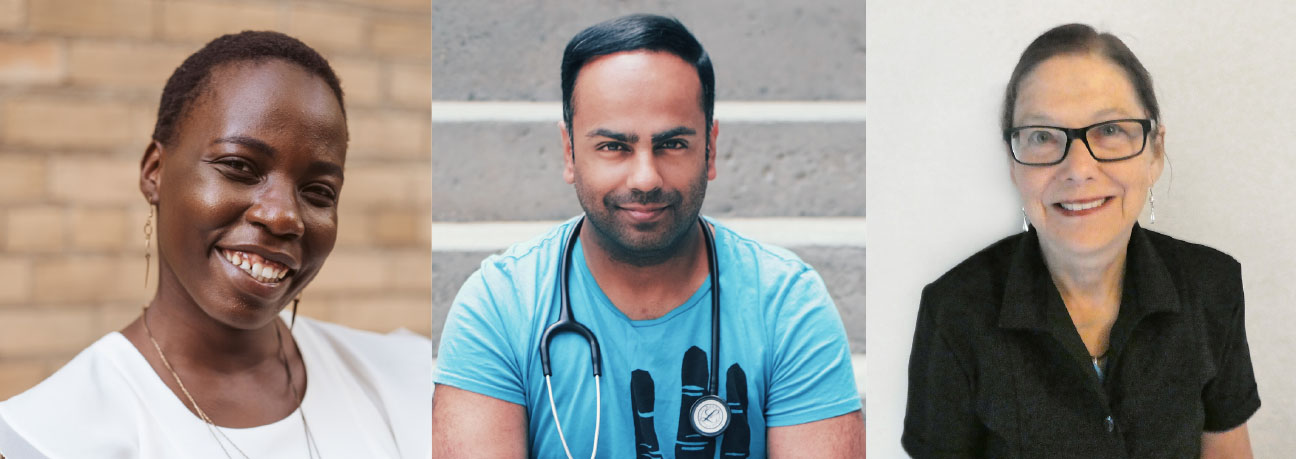This article originally appeared in the Fall 2021 issue of the Ontario Medical Review magazine.
Health-care planning must be done through an equity lens
When Dr. Naheed Dosani was a resident in Toronto he had a patient with head and neck cancer who was desperate for pain relief. The patient was in his early 30s and suffered from schizophrenia and homelessness. Because of the way he presented, he was often turned away from health facilities.
Dr. Dosani treated him and felt he had made a connection. But eventually, he learned his patient died of an overdose of alcohol and street drugs, which he was using to treat his pain.
“Right in our back yards, in a world-class city like Toronto with a world-class health-care system and palliative care system, someone experiencing homelessness can fall through the cracks again and again and again,” Dr. Dosani said. “This was a life-changing event for me.”
Dr. Dosani went on to specialize in providing palliative care and general medical care to people experiencing homelessness and poverty. He is one of many health professionals in Ontario trying to help people who are underserved despite living in cities with easy access to health care. Many of them are people without homes, or people who are living in poverty, are refugees or experience mental health problems, Dr. Dosani said.

From left to right: Dr. Cindy Ochieng, Dr. Naheed Dosani, and Dr. Jane Pritchard speak to the challenges and inequities they experience caring for patients in Toronto’s inner city.
In Prescription for Ontario: Doctors’ 5-Point Plan for Better Health Care, the OMA calls for everyone to be treated equally and fairly, with dignity and respect. Everyone should have access to a family physician and continuous medical care. Health-care planning must be done through an equity lens, and in a culturally sensitive way that breaks down barriers for ethnic, Indigenous, and LGBTQIA2S+ communities, and for those whose first language is not English.
Dr. Cindy Ochieng is a family physician who has worked at Parkdale Queen West Community Health Centre in Toronto for the past year. A major problem she deals with is not a general lack of medical resources — Toronto has greater access to diagnostics and specialists than other parts of the country, for instance — but a system that isn’t set up to distribute the resources equitably.
“Our centre prioritizes under-resourced populations like refugees, newcomers, LGBTQIA2S+ folks, and folks experiencing mental health issues, substance use issues, poverty, and homelessness. It’s systems of oppression that lead these folks to where they are,” Dr. Ochieng said.
Part of the solution is to provide care through different models beyond the traditional fee-for-service model, Dr. Ochieng said. Community health centres such as hers provide a team of health-care professionals with supports that help them treat patients with complex needs.
“As doctors, we’re taught to treat. For example, if it’s a bacterial infection, you prescribe antibiotics. But a lot of what I see in my practice are situations like someone with asthma requiring an air conditioner and not being able to afford one.”
So, she spends a lot of her time on advocacy, helping the patient get money for an air conditioner, or a patient with back pain get money for a bed. She’ll help them figure out where to apply for the money and how to fill out the forms and write letters confirming there is a medical necessity with the support of allied health members.
“Health care is political, and in health care we must work with government to improve the health outcomes of the people we care about and care for.” —Dr. Naheed Dosani
Dr. Jane Pritchard runs a family health group in Toronto Community Housing buildings in the Warden and St. Clair avenues area of Toronto and helped create an interprofessional team that serves the Oakridge neighbourhood. She says it’s important to provide a “medical home” for vulnerable people.
“The concept of a medical home is where there is continuity of the person, so, health care based around a personal relationship. It’s the old-fashioned way of being a family doctor in the modern sector. This is among people who have little reason to trust others. It’s very important to have that continuity of the person, to trust the person.”
It’s especially important for people facing difficult circumstances like living on the streets, Dr. Pritchard said. Doctors often have to earn their trust, and a continuous relationship can help them do that.
Homelessness and poverty can make even routine care difficult, Dr. Dosani said. People who are homeless may not have anywhere to keep medications. Even something as routine as preparing for a colonoscopy can be difficult if they don’t have easy access to a toilet.
Ultimately, Dr. Dosani firmly believes that social injustices like poverty and lack of housing are major health-care issues and that they are driven by “racism, xenophobia, transphobia, ableism, classism, capitalism, and a whole host of factors that drive those inequities.”
That means that part of a doctor’s job is to fight for changes to society.
“Health care is political, and in health care, we must work with government to improve the health outcomes of the people we care about and care for,” Dr. Dosani said.
Kurt Kleiner is a Toronto-based writer.